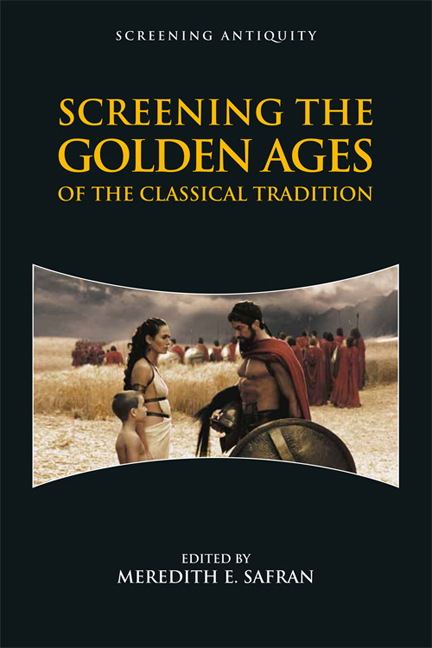Book contents
- Frontmatter
- Contents
- Series Editors’ Preface
- Editor's Acknowledgments
- Contributors
- Illustrations
- Abbreviations
- Introduction: Searching for Gold in an Age of Iron
- PART I THE GLORY THAT WAS GREECE
- PART II THE GRANDEUR THAT WAS ROME
- 8 “All That Glitters …”: Problematizing Golden-Age Narratives in Vergil's Aeneid and the Western Film Genre
- 9 The Golden Age and Imperial Dominance in the Aeneid and Serenity (2005)
- 10 Turning Gold into Lead: Sexual Pathology and the De-mythologizing of Augustus in HBO's Rome (2005–2007)
- 11 The Dux Femina Ends Westeros’ Golden Age: Cersei Lannister as Agrippina the Younger in HBO's Game of Thrones (2011–)
- 12 The Golden Aspects of Roman Imperialism in Film, 1914–2015
- 13 Broken Eagles: The Iron Age of Imperial Roman Warfare in Post-9/11 Film
- 14 Dreaming of Rome with Ridley Scott's Gladiator (2000)
- Filmography
- Bibliography
- Index
9 - The Golden Age and Imperial Dominance in the Aeneid and Serenity (2005)
from PART II - THE GRANDEUR THAT WAS ROME
Published online by Cambridge University Press: 23 November 2019
- Frontmatter
- Contents
- Series Editors’ Preface
- Editor's Acknowledgments
- Contributors
- Illustrations
- Abbreviations
- Introduction: Searching for Gold in an Age of Iron
- PART I THE GLORY THAT WAS GREECE
- PART II THE GRANDEUR THAT WAS ROME
- 8 “All That Glitters …”: Problematizing Golden-Age Narratives in Vergil's Aeneid and the Western Film Genre
- 9 The Golden Age and Imperial Dominance in the Aeneid and Serenity (2005)
- 10 Turning Gold into Lead: Sexual Pathology and the De-mythologizing of Augustus in HBO's Rome (2005–2007)
- 11 The Dux Femina Ends Westeros’ Golden Age: Cersei Lannister as Agrippina the Younger in HBO's Game of Thrones (2011–)
- 12 The Golden Aspects of Roman Imperialism in Film, 1914–2015
- 13 Broken Eagles: The Iron Age of Imperial Roman Warfare in Post-9/11 Film
- 14 Dreaming of Rome with Ridley Scott's Gladiator (2000)
- Filmography
- Bibliography
- Index
Summary
Joss Whedon's 2005 science-fiction film Serenity, which continues the story told in the Fox television series Firefly (2002), presents a twist on the Western genre. In a future where overpopulation on Earth has spurred the settlement of a distant solar system, humanity has become divided between those who submit to the imperialist rule of an interplanetary government known as the Alliance and those who live on the “frontier,” or outer planets, where the Alliance's rule is not as firmly established. Captain Malcolm “Mal” Reynolds (Nathan Fillion), a former “Browncoat” who fought on the losing side of the Independents during the Unification War and now commands a ship named Serenity, is the film's central character; he and his crew make a living through smuggling while hoping to stay under the Alliance's radar. In this “Space Western,” Serenity's audience sees how the main characters adopt the individualism and self-sufficiency characteristic of the Western genre in order to survive and create new lives for themselves in a post-war society in which the characters exist on the frontier lands of the outer planets, where “civilization” has not quite encroached on their way of life.
Kirsten Day has argued that many Western films can be interpreted as deriving inspiration from Vergil's Aeneid, an epic poem about the arrival of the Trojans in Italy. Both the genre of the Western and Vergil's ancient epic poem focus on empire and nation-building, and both feature characters who are forced to rebuild their lives after war. Indeed, characters in both Western films and the epic poem must fulfill their destinies and also wish to create a better society in which to live. But both works feature conflict when the characters challenge what constitutes a better world and question the promise of a superior way of living. The Aeneid depicts prophecies of the Roman Empire, during the reign of the emperor Augustus, which forecast the delivering of security and peace after decades of civil war. In Serenity, the imperialist Alliance claims to offer stability and civilization to the population in exchange for the loss of personal freedoms in the wake of their universe's civil war. Such promises of a better world and superior way of living draw upon the ancient myth of the golden age.
- Type
- Chapter
- Information
- Screening the Golden Ages of the Classical Tradition , pp. 175 - 190Publisher: Edinburgh University PressPrint publication year: 2018



